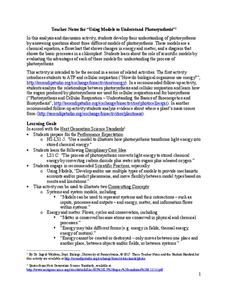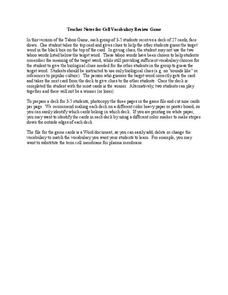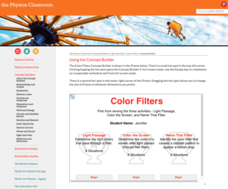NASA
Food For Thought
Science can be quite tasty. A delectable unit from NASA shows learners why it's important to consider food, nutrition, and health in space. Four lessons explore the idea in great depth, including testing cookie recipes. Along the way,...
Center for Technology in Teaching and Learning
MedMyst Mission 3: Nemesis at Neuropolis
Calling all science sleuths! A patient appears to have a disease eradicated years ago—how do you treat it? Scholars must research the illness, the possible causes, and find a cure before the disease spreads and wipes out the entire city....
Center for Technology in Teaching and Learning
MedMyst Mission 1: Orientation at O.R.B.
A dozen years after a great plague wipes out the majority of Earth's civilization, a group of scientists joins together to fight infectious diseases. Scholars join the training mission and learn about viruses, bacteria, pathogens and...
California Academy of Science
Optimal and Sustainable: Renewable Energy Revamp
More than 100 cities around the world have shifted from fossil fuels to renewable energy sources. Scholars investigate a city wanting to make this switch, but needs help determining how to make the shift. Groups consider all options,...
California Academy of Science
Building Better Buses: Transportation Design Challenges
Scholars learn about a series of three challenges when they design a bus system for a small town. They determine the bus routes and then figure out the best type of fuel to use before considering the cost of going electric. Learners...
PBS
Map a Model Solar System
Creating a solar system map is a snap thanks to a hands-on activity! Science scholars explore the solar system by building it wherever they choose during an interactive from PBS's Space series. Users pick both the location and scale for...
Mascil Project
Molecular Gastronomy - Science in the Kitchen
Some say cooking is an art—and a science! Scholars scope out the savory subject of molecular gastronomy with a series of related activities. The teacher's guide contains printable worksheets and helpful tips for implementing the lesson.
PBS
Ocean Circulation in the North Atlantic
Swirling and churning, the waters of the North Atlantic play a vital role in Earth's climate! Discover the many factors that produce circulation using a multimedia lesson from PBS's Weather and Climate series for high schoolers. Scholars...
Magic of Physics
Forces Lab
Here's a force to be reckoned with in the physics classroom! Scholars discover the movements associated with tension, compression, and other common forces through a hands-on simulation. Pupils pull, push, and twist their way through each...
Serendip
Using Models to Understand Photosynthesis
Is your class in the dark about photosynthesis? Shed some sunlight on an important biological process with a thoughtful activity. After answering questions to help determine their level of knowledge, learners work with chemical equations...
Serendip
Cell Vocabulary Review Game
Can science scholars describe a nucleus without mentioning DNA, or a chloroplast without mentioning the color green? Test their organelle understanding through an exciting card game. Groups take turns guessing the correct organelle or...
Serendip
Photosynthesis Investigation
Can scientists increase the rate of photosynthesis to help clean the air? Scholars complete an experiment determining net photosynthesis. Then, they apply knowledge from the activity to design their own investigations of the factors that...
Howard Hughes Medical Institute
Drug Adherence and Resistance
The FDA approved more than 25 drugs to treat HIV—and often people must use them in combination. One of the largest challenges with these medications happens due to patient error. Class members use an interactive to learn about drug...
Physics Classroom
Color Filters
Filters provide amusing changes to images in applications other than just Instagram! High school pupils apply their knowledge of colored filters to three different interactive sets of puzzles. They identify light colors that pass through...
Physics Classroom
Color Pigments
Objects contain pigments that selectively absorb a wavelength of light, and our eyes only observe a very small range of these wavelengths. Scholars apply these two facts to three different activities. They identify the pigment in an...
Physics Classroom
If This, Then That: Color
The dress color debate of 2015 taught the importance of understanding how we see light. Scholars view a shirt under two different colored lights and then must predict what color the shirt will appear under a third light. They apply color...
Physics Classroom
Light Intensity
Light intensity varies by the strength of the light bulb as well as the distance to the light bulb. Pupils apply these concepts independently at first. They must solve for the light intensity as either the distance or the wattage of the...
Physics Classroom
Spectrum
Scholars relate each of the colors in the spectrum, except indigo, by comparing their frequencies, wavelengths, and energy levels. Then, they compare each section of the electromagnetic spectrum when considering the same three variables.
Physics Classroom
Total Internal Reflection
Scholars work through three different activities applying their knowledge of total internal reflection (TIR). First, they simply identify which diagrams create TIR and which don't. Next, they match different types of boundary behaviors...
Physics Classroom
The L.O.S.T. Art of Image Description - Converging Lenses
Magnifying glasses and cameras often use converging lenses, but how do they alter an image? Pupils discover a lens, axis, and object arrow before identifying four characteristics of the resulting image. They label the location,...
Physics Classroom
Law Enforcement - Refraction
Pupils apply their knowledge of refraction to four different sets of challenges. Each of the first three focus on one variable's impact on the direction of bending. The fourth combines variables for greater challenge.
Physics Classroom
The L.O.S.T. Art of Image Description - Curved Mirrors
We see curved mirrors every day in spoons, rear-view mirrors, stores as a safety measure, make-up mirrors, and in novelty stores. Scholars explore the changes to an image based on the curve of the mirror, the location of the image, and...
Physics Classroom
Who Can See Who?
While only briefly mentioned in most Physics books, plane mirrors and their applications offer the basics necessary for future studies. While working through an interactive, pupils demonstrate knowledge of both reflection and its forms....
Physics Classroom
Law of Reflection
Reflection seems simple to understand, but without a complete understanding, pupils struggle with ray diagrams, specular versus diffuse reflection, total internal reflection, and image formation. An engaging interactive provides three...

























